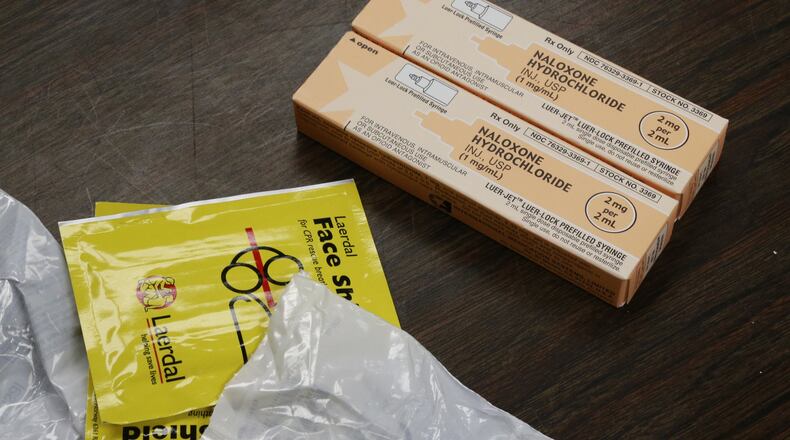“It’s very hard ... It’s definitely hitting us,” said Springfield Assistant Fire Chief Matt Smith. “It is a problem, it continues to be a problem.”
Smith, who’s been with fire and EMS for 30 years, said the normal dose of Narcan is not saving lives like it used to in past years. Before, two milligrams would work, but now that amount doesn’t always help, forcing first responders to use multiple doses.
He said personnel are at a point now where they’re discussing on increasing the amount of Narcan in each dose.
“I’ve heard repeated calls from our paramedics where they’re giving it all, and it just barely takes effect, if at all,” he said. “The Narcan is not sufficient.”
This year so far, the Springfield Fire Rescue Division has had 77 overdose patients with 162 doses of Narcan administered. For all of 2022, the department had 232 total overdose patients with 501 total doses given.
A part of the problem is not only the amount of drugs people are taking but also the type of drugs, which are “so much more powerful” than before, and Narcan only helps short-term, Smith said.
“People have it in their house and they give it to a family member, they still need to call us because it might keep them breathing long enough for us to get there. But if they say, ‘OK, I gave them Narcan, we’re fine,’ they’ll collapse again,” he said.
Smith said there always seem to be a new drug coming out, which doesn’t help with the amount of overdoses and people who become addicted.
“The first thing is don’t even take that first hit because some of these things do create an instant addiction,” he said. “Once they’re hooked, it’s extremely difficulty for them to get help and there are a variety of agencies that are trying to help people.”
Wendy Doolittle, CEO of McKinley Hall, also said the community is seeing an uptick in overdoses, and she suspects the drug Xylazine is the new culprit.
Xylazine, also known as “Tranq,” is a non-opiate sedative, analgesic, and muscle relaxant, and its only FDA-approved use is for veterinary use, according to the U.S. Drug Enforcement Administration, who said it’s been increasingly identified as a cutting agent/adulterant in the illicit drug supply, often mixed with fentanyl.
“We offer training on how to use Narcan to save lives. We also provide information on how to access care and move towards a life of recovery,” Doolittle said. “We offer spaces where people feel safe and respected.”
The center, which sees about 700 people a year, has a harm reduction program that provides a Syringe Services Program, which aims to work directly with individuals in the community who are actively using drugs. They provide peer support to remove barriers and help people access necessary services that will move them closer to recovery.
The Clark County Combined Health District also focuses on harm reduction through syringe services for safer use, and provides Narcan and safety kits with items such as antibiotic ointment, alcohol pads and Band-Aids, said Jacob Clark, drug overdose prevention grant coordinator at CCCHD.
“We know that everyone is not going to engage in recovery and, therefore, we put different services in place to help them to reduce harm to themselves and the community while they continue in active substance use,” Doolittle said.
She said many people struggle with the concept of harm reduction, but the goal is to “keep people to stay alive and safe until they are able to engage in services.”
“Non-fatal overdoses give us an opportunity to intervene and start the process of moving towards a healthier way of living,” she said.
McKinley offers other services including withdrawal management, residential treatment, partial day treatment, intensive outpatient, aftercare, recovery housing, case management, transportation, peer support, outreach, as well as collaborate with local organizations, such as the CCCHD, to link clients to other needed support services.
The center has a group of people that follow up with individuals and families that have experienced non-fatal overdoses and that provide the family with Narcan kits.
Those who need services can walk in between 8:30 a.m. and 2 p.m., Monday through Thursdays. For more information, visit www.mckinleyhall.org.
About the Author

